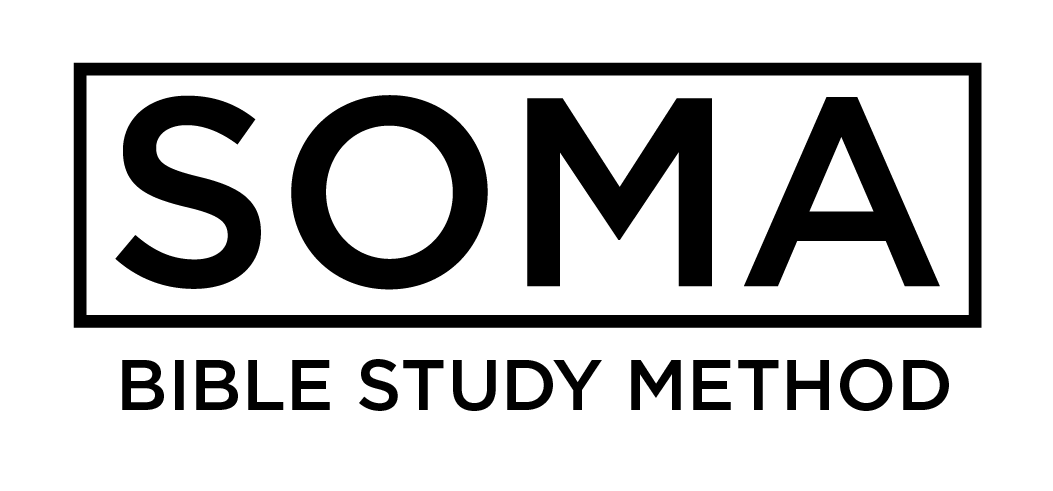SOMA* is an easy to use Bible study method for jumping into a passage and mining its riches. This method can be repeated with any passage of the Bible and used for personal Bible reading, one-on-one bible study, and small group bible study. Our hope and prayer is that our church body could learn this method over time and have confidence in reading the Bible on their own, as well as with others.

*Fun fact: ‘Soma’ is the Greek word for ‘body,’ which is really what this is all about: building up the body of Christ, the church.
equipping the saints for the work of ministry, to build up the body of Christ, until we all reach unity in the faith and in the knowledge of God’s Son, growing into maturity with a stature measured by Christ’s fullness. -- EPHESIANS 4:12-13
Here are the steps:
Soak
Read the passage three times asking the Holy Spirit to open it to you. We want to soak in it, marinate, steep in it, asking the Spirit to guide us into the scriptures and notice its surroundings.
We want to ask questions about the context of the passage in these areas:
-
Genre:
What kind of writing is this? Is this a Narrative? Poem? Letter? We might run into trouble if we try to read Psalms like we read Romans.
-
Circumstances:
Who is writing this? To whom? Are there any clues as to why? Maybe the Israelites are worshipping idols again. Maybe Paul is in prison again. Maybe the Corinthians messed up again.
-
Connection to the rest of the story:
Where does this passage fit in to the rest of the book? What has happened so far?
Observe
Once we’ve soaked in passage, we want to make sure we are able to see all that is really there. Not interpreting, but taking note of what is present.
We want to ask ask observation questions of the text:
-
What are the key words?
Are there any words or ideas that are repeated?
-
What do you learn about the main characters?
How are they described by the author?
-
Is time or place significant in this passage?
-
Is there a conflict?
-
Are there any surprises?
-
Do you have any questions from the passage? Is there anything difficult to understand or something you’d like to ask the author?
Meaning
Now that we’ve gotten familiar with the passage, knowing what is there, we want to get at its meaning. The meaning of the passage doesn’t come from us, but from the author. Instead of asking questions like: “What does this passage mean to me?”, we want to ask questions like: “What is Matthew trying to say?”
Here are some questions to help arrive at the meaning:
-
What is the main point of the passage? What is the author really trying to get across?
-
How could you sum up the meaning of this passage in your own words?
-
What does this passage reveal about who Jesus is, and what he came into the world to do?
-
(Specifically in Old Testament) How does the coming and work of Jesus on the cross change how we understand this passage?
Apply
After trying to wrap our heads around the meaning of the passage, we want to seek to apply it to our lives. The goal of reading the Bible is transformation. We want to let the Word of God grow deep in us so that we can bear much fruit.
A helpful way to think about application is to ask questions about how it transforms our head(knowledge and beliefs), our heart (desires and attitudes), and our hands (activities and practices).
-
Head: How does this passage challenge or confirm your beliefs?
-
Heart: How does this passage challenge your desires and attitudes? Is there something you need to change?
-
Hands: What does this passage tell us to go and do with our energy, time, and resources?
-
Is there any response to this passage you feel that the Spirit is impressing upon you?
PRAYER
Finish your time in God’s Word by using this passage as the subject of your prayer. Take time to thank God for what was learned and express your desire for His continued work of transformation in your life.
Examples:
